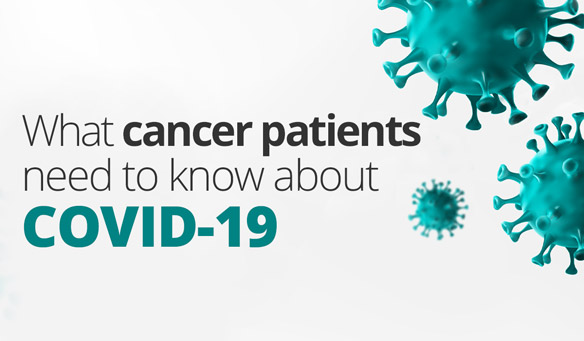Is someone with cancer at a higher risk of contracting COVID-19?
It’s not currently known whether cancer patients have a higher risk of contracting COVID-19 or not. There is a fairly high rate of transmission of the virus irrespective of a cancer diagnosis. However, since some cancer patients are immunosuppressed, they may be at a higher risk of contracting the virus. The virus is so new that this has not been fully studied yet. There is emerging data that suggests that if an individual with cancer did contract COVID-19, there may be more severe complications due to the infection.
Why would COVID-19 be more severe in an individual with cancer?
The immune system of an individual with cancer is often weaker, especially during chemotherapy. Therefore, during this time they may be more susceptible to the complications once an infection occurs with any virus, including influenza. A cancer patient’s risk for developing a more severe case is individualized based on several factors. These include patient history and type of cancer they have, whether they’re receiving chemotherapy, and how immunosuppressed they are.
Are all cancer patients immune-compromised?
No, definitely not. In fact, a number of patients who are in survivorship care, who have been in remission for years, in most instances their immune system is close to, if not completely, back to normal. Even among patients currently receiving chemotherapy, the immune system is often reconstituted in a fairly brisk manner within a couple months of concluding treatment.
Should cancer patients currently receiving treatment at a medical facility continue to go for treatment?
There’s not a one size fits all answer for this. It should be highly individualized. Patients and their physicians must weigh the benefits versus the risks. In many cases, the benefits of treatment outweigh the risks of stopping or delaying therapy. There are other situations in which we have some more flexibility in terms of delaying or rescheduling treatment. Again, it’s not one size fits all. It depends on the type of cancer, the treatment, and of course the patient’s preference. Patients should talk with their oncologist to determine the best individualized treatment plan for them.
Are the symptoms of COVID-19 the same in cancer patients?
The data set is small, but at this time, we believe that the symptoms are likely the same. Patients with COVID-19 have mild to severe respiratory illness symptoms including:
- Fever
- Cough
- Shortness of breath
- Loss of appetite or diarrhea
What should a cancer patient do if they are having COVID-19 symptoms?
Call your oncology team. Your next steps will be individualized depending what symptoms you have, where you are in your treatment course, whether the symptoms may be related to the cancer or cancer treatment, if you need to go to the emergency room, and the resources available to your healthcare team.
How can cancer patients protect themselves from COVID-19?
The same medical guidelines and precautions being recommended for everyone else.
- Wash hands often with soap and water for 20 seconds or more
- If soap and water are not available, use hand sanitizer with at least 60% alcohol
- Avoid touching your eyes, nose or mouth
- Avoid contact with people, especially those who are sick
- Cover your mouth and nose with a tissue when coughing or sneezing, and then discard the tissue
- Clean and disinfect frequently touched objects and surfaces using a regular household cleaning spray or wipe
- Exercise appropriate social distancing

